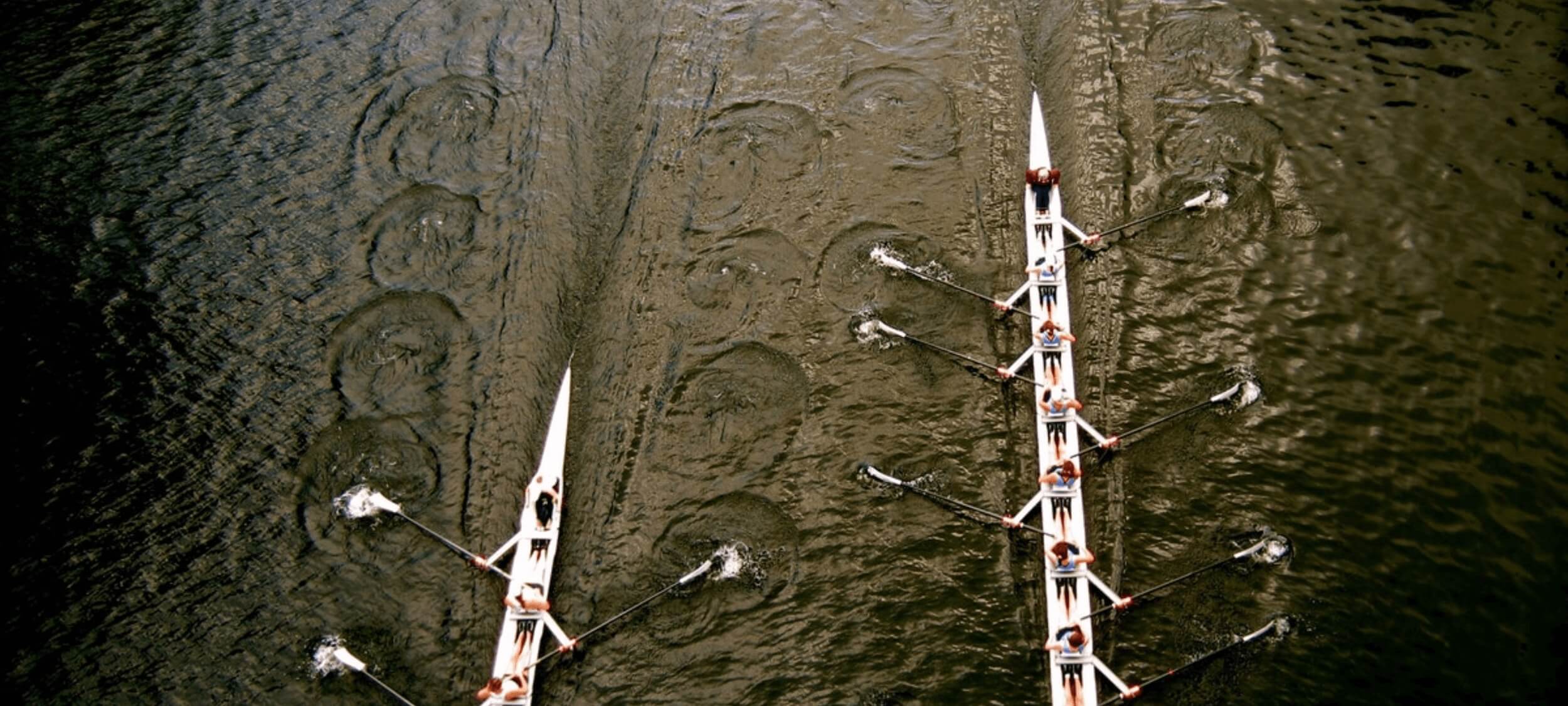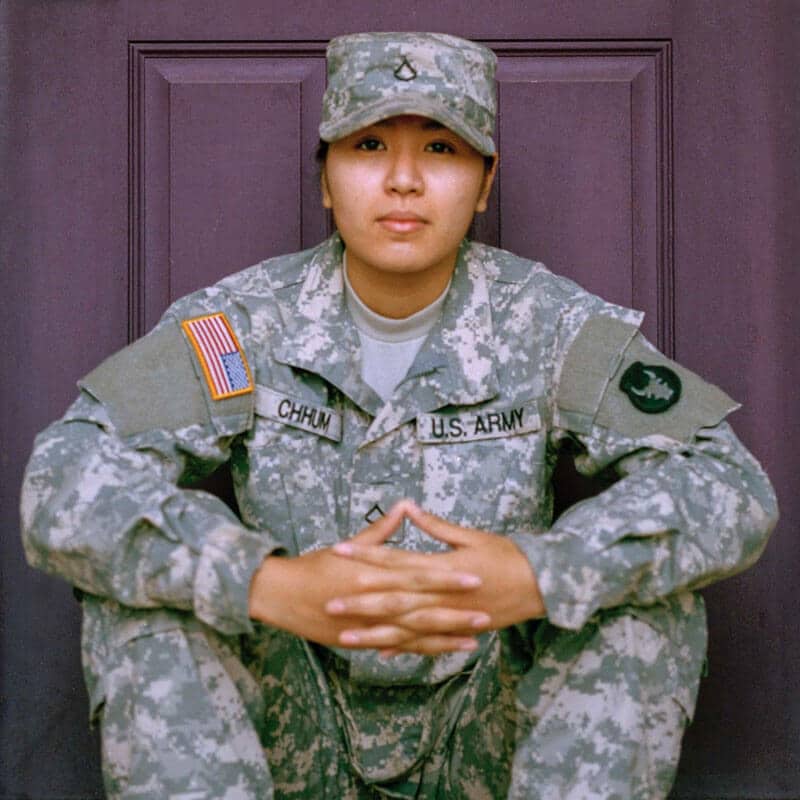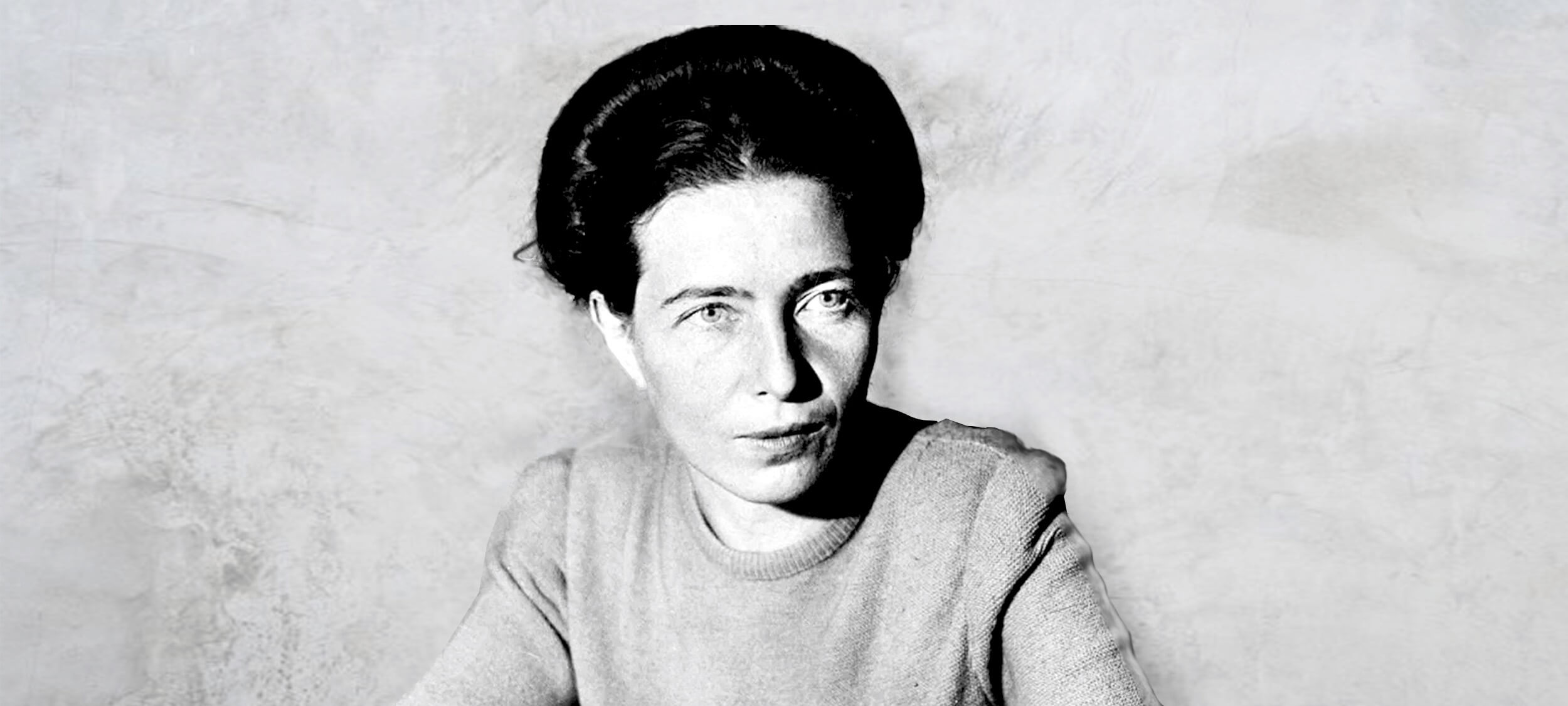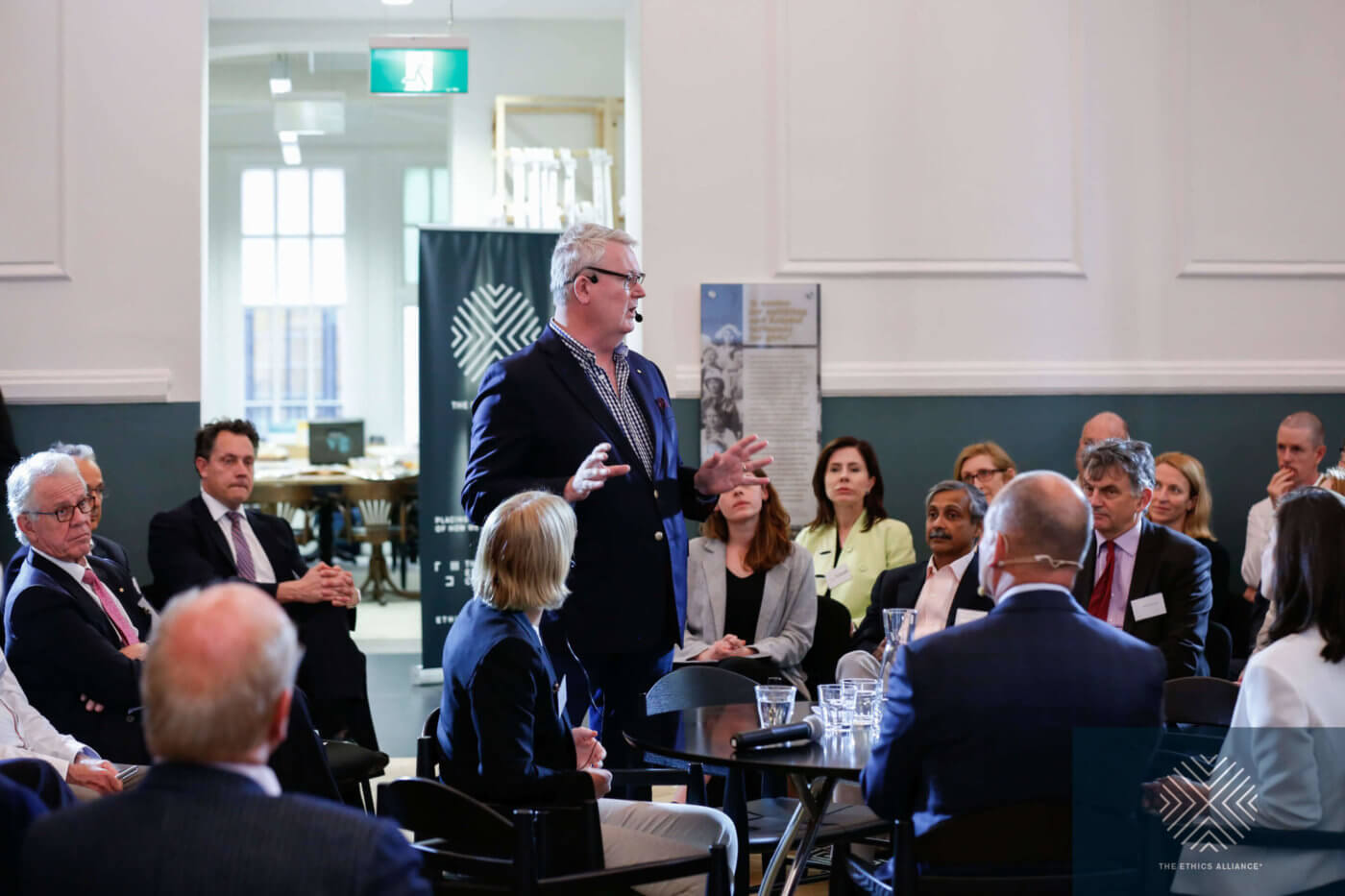Workplace ethics frameworks

A placard used to hang in the office of Milton Hershey, founder of the revolutionary chocolate company carrying a simple motto: “Business is a matter of human service”.
Hershey shaped his organisation around a progressive, generous employment model. In a time when corporate leaders were seen as villains and Theodore Roosevelt won the White House election on the promise of breaking up monopolies and regulating business more firmly, Hershey’s was seen by many as a model of responsible, prosocial business.
At the same time, Cadbury in the UK were making similar moves. Each company built a fully-serviced town for their employees, offered children an education, taking responsibility for supply chains, and gave the public tours of the facilities.
In Connect: How Companies Succeed by Engaging Radically with Society, John Browne suggests the companies “identified the potency of a corporate vision delivered through employees” – a message which is “as true today as it was in 1900”. Who said chocolate wasn’t good for us?
Today, we’d recognise elements of their activity – firm social purpose and activity driven by value rather than profit – as elements of an ethics framework, a central, defining expression of what a company believes in and seeks to uphold.
Ethics frameworks consist of three things: a purpose statement, values and principles.
They aren’t documents to be filed away or popped in a corner of the company website, never to be read. Writing a document about who we are and what we stand for means nothing unless those statements are lived and breathed in the company operation.
Like the confectioners of the early 20th century, the very best companies bring cohesion to their business decisions by showing staff the meaning of their values, purpose and principles. They work with them to show how these core ideals guide everyday business decision making.
Purpose statements can be long or short. They usually don’t focus on products or services but how, as Hershey recognised, your company is satisfying a community need.
Values and principles enable employees to distinguish between good and bad decisions. They help to frame business activity to ensure it stays true to its purpose and contract with society.
Together these form your ethics framework: the bedrock or ‘DNA’ of your organisation. A good framework will be:
- Practical – able to be applied in practice and with consistency.
- Authentic – it will ‘ring true’.
- Stable – will not change much (in its essence) over the long term.
- Understandable – by all of those required to apply it in practice.
Having an ethics framework isn’t designed to maximise profits. It’s designed to protect and improve the relationship between business and society – but it does often benefit the business as a commercial enterprise as well. By motivating employees and demonstrating the value and purpose of the business to them, they serve as ambassadors for your organisation.
What’s more, trusted organisations are more likely to survive the instances when they fall foul of public opinion. In 1909, Cadbury – until then widely respected – were accused of being involved in slave labour in Portugal. Despite the public outcry, Cadbury were able to survive the incident and restore their reputation because of the goodwill they’d earned through authentically living their ethics framework.
Although purpose statements, corporate values and organisational principles aren’t a guarantee of perfect ethical conduct, they are a crucial ingredient in building a culture in which bad behaviour is discouraged and dis-incentivised – and a flag of goodwill to stakeholders that your organisation is looking to serve humanity and not just turn a quick buck.
Ethics in your inbox.
Get the latest inspiration, intelligence, events & more.
By signing up you agree to our privacy policy
You might be interested in…
Opinion + Analysis
Business + Leadership
Why you should care about where you keep your money
Opinion + Analysis
Health + Wellbeing, Business + Leadership
Repairing moral injury: The role of EdEthics in supporting moral integrity in teaching
Opinion + Analysis
Business + Leadership
Money talks: The case for wage transparency
Opinion + Analysis
Business + Leadership
Accountability the missing piece in Business Roundtable statement
BY The Ethics Centre
The Ethics Centre is a not-for-profit organisation developing innovative programs, services and experiences, designed to bring ethics to the centre of professional and personal life.
Ethics Explainer: Dirty Hands

Ethics Explainer: Dirty Hands
ExplainerBusiness + LeadershipPolitics + Human Rights
BY The Ethics Centre 29 MAR 2016
The problem of dirty hands refers to situations where a person is asked to violate their deepest held ethical principles for the sake of some greater good.
The problem of dirty hands is usually seen only as an issue for political leaders. Ordinary people are typically not responsible for serious enough decisions to justify getting their hands ‘dirty’. Imagine a political leader who refuses to do what is necessary to advance the common good – what would we think of them?
Michael Walzer steps in
This was the question philosopher Michael Walzer asked when he discussed dirty hands, and another philosopher, Max Weber, had asked before him.
Walzer asks us to imagine a politician who is elected in a country that has been devastated by civil war, and who campaigned on policies of peace, reconciliation and an opposition to torture. Immediately after this politician is elected, he is asked to authorise the torture of a terrorist. The terrorist has hidden bombs throughout apartments in the city which will explode in the next 24 hours. Should the politician authorise the torture in the hope the information provided by the terrorist might save lives?
Finding common ground
This is a pretty common ethical dilemma, and different ethical theories will give different answers. Deontologists will mostly refuse, taking the ‘absolutist’ position that torture is an attack on human dignity and therefore always wrong. Utilitarians will probably see the torture as the action leading to the best outcomes and argue it is the right course of action.
What makes dirty hands different is it treats each of these arguments seriously. It accepts torture might always be wrong, but also that the stakes are so high it might also be the right thing to do. So, the political leader might have a duty to do the wrong thing – but what they are required to do is still wrong. As Walzer says, “The notion of dirty hands derives from an effort to refuse ‘absolutism’ without denying the reality of the moral dilemma”.
The paradox of dirty hands – that the right thing to do is also wrong – poses a challenge to political leaders. Are they willing to accept the possibility they might have to get their hands dirty and be held responsible for it? Walzer believes the moral politician is one who has dirty hands, acknowledges it, and is destroyed by it (because of feelings of guilt, punishment and so on): “it is by his dirty hands that we know him”.
Note that we’re not talking about corruption here where politicians get their hands dirty for their own selfish reasons, like fraudulent reelection or profit. What we’re talking about is when a politician might be obliged to violate their deepest personal values or the ethical creeds of their community in order to achieve some higher good, and how the politician should feel about having done so.
A remorseful politician?
Walzer believes politicians should feel wracked with guilt and seek forgiveness (and even demand punishment) in response to having dirtied their hands. Other thinkers disagree, notably Niccolo Machiavelli. He was also aware political leaders would sometimes have to do ‘what’s necessary’ for the public good. But even if those actions would be rejected by private ethics, he didn’t think decision makers should feel guilty about it.
Machiavelli felt indecision, hesitation, or squeamishness in the face of doing what’s necessary wasn’t a sign of a good or virtuous political leader – it was a sign they weren’t cut out for the job. Under this notion, the good political leader won’t just accept getting their hands dirty, they’ll do it whenever necessary without batting an eyelid.
Ethics in your inbox.
Get the latest inspiration, intelligence, events & more.
By signing up you agree to our privacy policy
You might be interested in…
Opinion + Analysis
Business + Leadership
The case for reskilling your employees
Opinion + Analysis
Business + Leadership
How to spot an ototoxic leader
LISTEN
Health + Wellbeing, Business + Leadership, Society + Culture
Life and Shares
Opinion + Analysis
Science + Technology, Business + Leadership, Society + Culture
AI might pose a risk to humanity, but it could also transform it
BY The Ethics Centre
The Ethics Centre is a not-for-profit organisation developing innovative programs, services and experiences, designed to bring ethics to the centre of professional and personal life.
How to deal with an ethical crisis

How to deal with an ethical crisis
Opinion + AnalysisBusiness + Leadership
BY Simon Longstaff The Ethics Centre 8 MAR 2016
The recent dissection of CommInsure’s heartless treatment of some of its policy holders (including fellow employees) by Fairfax Media and ABC’s 4 Corners program reinforced every bad stereotype there is about the world of banking and finance.
The people whose stories were featured in the reports were treated in a manner that made me wince. You’d think that people of even moderate decency would have realised that what was being done was wrong. Yet the evidence is incontrovertible.
Basic decency was set aside in favour of the financial interests of the corporation and, one suspects, the people making the decisions. Until now, the cost of this has been borne by those whose claims were denied.
Now the price is being paid by the Commonwealth Bank and the vast majority of innocent employees who will have been appalled and ashamed by what has been revealed.
Now that the issues have been exposed, the first order of business should be to remedy the harms that were caused to individuals who had a right to expect that their legitimate interests would not be sacrificed for commercial gain.
The particular vulnerabilities of those affected make for especially chilling stories. No person, whatever their circumstances, should have the careful parsing of the language of insurance policies turned against them. We all buy insurance in the expectation that it will be available when we really need it. It is just plain ‘tricky’ when loopholes are used to deny our reasonable expectations.
It is time that we developed a more mature understanding of what it means to live an ethical life as an individual or as an organisation.
The second order of business must be to rescue the concept of ‘ethics’ in banking and finance. In recent months, I have spoken to a number of senior leaders in the banking and finance industry about their signing the Banking + Finance Oath. As things stand, about 600 people have made a personal commitment to the tenets of the Oath. Every person with whom I have spoken supports what the Oath says and stands for.
However, quite a few are reluctant to sign for fear that something might go wrong – and that in the face of evidence of ‘ethical failure’ they will be accused of hypocrisy.
Their misgivings are understandable – especially after the CommInsure scandal. It was only at the CBA’s last AGM that the Chairman and CEO both raised the issue of ethics – making a commitment to become an “ethical bank“. At the time, cynics scoffed at the idea. In recent days, and quite predictably, the CBA has been ‘hit over the head’ (clobbered is probably the better word) with this aspiration. No wonder people are nervous about making a public commitment to ethics!
The Ethics Centre worked extensively with the CBA in late 2014 and early 2015 (but not with CommInsure) and I have a high regard for the sincerity with which they laid out a path for ethical development at the 2015 AGM. What was said then should not be dismissed out of hand – and especially not because of recent events. Rather, we should ensure that the standard by which we assess the CBA is a reasonable one – and then judge accordingly.
To think that any individual (other than a saint) can achieve ethical perfection is unfair and unrealistic. I certainly wouldn’t measure up to that standard. To think that an organisation of 50,000 people will be perfect is just ridiculous. What we can (and should) expect is that an ethical organisation will distinguish itself with a number of key features.
First, it will actively seek to reinforce the application of its values and principles – not just at the rhetorical level but as part of an ongoing program to root out and eliminate all systems, policies and structures that might subtly (and not so subtly) lead people to act in a manner that is unethical.
Second, it will build a culture of open communications in which people are rewarded (and certainly not punished) for drawing attention to practices that appear to be inconsistent with the organisation’s declared ethical framework.
Third, an ethical organisation will be marked by the quality and character of its response to ethical failure. For example, it will own up to its own failings. It will remediate and compensate for any harms done. It will ensure that the lessons to be learned are widely published for the benefit of others. It will aim to do what is right – and not just the minimum that it is required to do.
This third aspect was evident in Ian Narev’s response to questioning on Four Corners. I believe his expressions of concern were sincere and that he will follow up, personally, with the affected individuals. Beyond this, I have no doubt (but no certain knowledge) that he is leading a process that will meet the expectations outlined above. That CBA follows this path will be a surer indication of its commitment to ethics than the fact that this shameful series of events occured in the first place. And that is what we need to evaluate.
An ethical organisation will be marked by the quality and character of its response to ethical failure.
It is time that we, in society, developed a more mature understanding of what it means to live an ethical life as an individual or as an organisation. If we cannot be perfect, then we can at least be held to account for the sincerity with which we make our best efforts to act, in good conscience, in conformance with our chosen values and principles.
And second, we should be accountable for the competence we bring to bear in our ethical decision-making – it’s a skill that cannot be taken for granted and needs development through active, reflective practice.
If this (rather than perfection) was the standard we insisted on – for ourselves and others – then more people in the world of banking and finance might publicly commit to what they know, in their heart-of-hearts, to be right and good.
Ethics in your inbox.
Get the latest inspiration, intelligence, events & more.
By signing up you agree to our privacy policy
You might be interested in…
Opinion + Analysis
Business + Leadership
Tim Walker on finding the right leader
Opinion + Analysis
Business + Leadership
Doing good for the right reasons: AMP Capital’s ethical foundations
Opinion + Analysis
Business + Leadership
It’s time to talk about life and debt
Explainer
Business + Leadership, Climate + Environment
Ethics Explainer: Ownership
BY Simon Longstaff
Simon Longstaff began his working life on Groote Eylandt in the Northern Territory of Australia. He is proud of his kinship ties to the Anindilyakwa people. After a period studying law in Sydney and teaching in Tasmania, he pursued postgraduate studies as a Member of Magdalene College, Cambridge. In 1991, Simon commenced his work as the first Executive Director of The Ethics Centre. In 2013, he was made an officer of the Order of Australia (AO) for “distinguished service to the community through the promotion of ethical standards in governance and business, to improving corporate responsibility, and to philosophy.” Simon is an Adjunct Professor of the Australian Graduate School of Management at UNSW, a Fellow of CPA Australia, the Royal Society of NSW and the Australian Risk Policy Institute.
BY The Ethics Centre
The Ethics Centre is a not-for-profit organisation developing innovative programs, services and experiences, designed to bring ethics to the centre of professional and personal life.
Australia is no longer a human rights leader

Australia is no longer a human rights leader
Opinion + AnalysisBusiness + LeadershipPolitics + Human Rights
BY Georgie Bright The Ethics Centre 23 FEB 2016
On February 8, Prime Minister Malcolm Turnbull announced the appointment of Philip Ruddock – the former immigration minister who presided over the Howard government’s notorious “Pacific Solution” to divert asylum seekers from its shores – as Australia’s first special envoy for human rights.
This surprising recycling of Ruddock is part of the government’s campaign for a seat at the United Nations Human Rights Council for the 2018-2020 term.
Not too long ago, then Prime Minister Tony Abbott said Australia was “sick of being lectured to” by the United Nations. But even the new government is demonstrating a willingness to dismiss inconvenient human rights obligations. In Human Rights Watch’s annual World Report – which documents human rights practices in more than 90 countries – Australia’s human rights record over the last year showed how far the country has to go.
It is difficult not to be disillusioned by the state of human rights in Australia. This is especially the case regarding the treatment of migrants and asylum seekers, and the discrimination faced by Indigenous Australians.
Australia’s candidacy for a seat at the Human Rights Council provides an important opportunity for Australia to address its domestic human rights issues.
Australia’s position on refugee protection has been to undermine and ignore international standards rather than uphold them. The country maintains a harsh boat turn-back policy, returning migrants and asylum seekers to countries including Indonesia, Sri Lanka, and Vietnam after only the most cursory of screenings.
Australia has a policy of mandatory detention for all unauthorised arrivals, transferring migrants and asylum seekers to offshore processing sites in less-equipped countries such as Nauru and Papua New Guinea. An independent review and a report by the Australian Human Rights Commission found evidence of sexual and physical abuse of children on Nauru.
Instead of trying to ensure the safety of the asylum seekers and refugees in Australian immigration detention facilities, the government acted to limit public discussion of important refugee and migrant issues. It passed a law that makes it a crime punishable by two years jail if immigration service providers disclose “protected information”.
Following a ruling by the High Court, 267 asylum seekers in Australia, including 91 children, faced involuntary transfer to Nauru and Manus Island. The High Court ruled on narrow statutory grounds and did not consider Australia’s compliance with international refugee law.
Another area where Australia is falling behind is Indigenous rights. In November 2015, Australia appeared before the UN Human Rights Council to defend its rights record as part of the Universal Periodic Review process. Many countries urged Australia to address disadvantage and discrimination faced by Indigenous Australians. The government’s “Closing the Gap” report for 2016 highlighted mixed progress in meeting targets in education and health, with Indigenous Australians still living on average 10 years less than non-Indigenous Australians.
Indigenous Australians remain disproportionately represented in the criminal justice system, with Aboriginal women being the fastest growing prisoner demographic. Aboriginal and Torres Strait Islander children under the age of 18 are overrepresented in youth detention facilities—representing more than half of child detainees.
Australia’s candidacy for a seat at the Human Rights Council provides an important opportunity for Australia to address its domestic human rights issues.
Australia is a vibrant democracy with a multicultural society and a solid history of protecting and promoting human rights values. Following the horror of World War II, Australia played an integral role in the development of the United Nations. In 1948, Australia’s Dr Herbert Vere Evatt, as president of the General Assembly, oversaw the adoption of the Universal Declaration on Human Rights.
But to regain the moral high ground and respect international law, Australia should urgently address these and other shortcomings in its human rights record. For starters, the government should stop transferring migrants and asylum seekers offshore, and provide them with fair and timely refugee status determination in Australia.
On Indigenous rights, it needs to intensify its commitment to addressing the underlying causes of gaps in opportunities and outcomes in health, education, housing and employment between Indigenous and non-indigenous and do more to address the high incarceration rate.
Australia once was an international human rights leader – and should be again.
Ethics in your inbox.
Get the latest inspiration, intelligence, events & more.
By signing up you agree to our privacy policy
You might be interested in…
Explainer
Politics + Human Rights, Relationships
Ethics Explainer: Dignity
Opinion + Analysis
Business + Leadership, Science + Technology
MIT Media Lab: look at the money and morality behind the machine
Opinion + Analysis
Business + Leadership
Workplace ethics frameworks
Opinion + Analysis
Business + Leadership, Politics + Human Rights
Democracy is still the least-worst option we have
BY Georgie Bright
Georgie Bright is the Australia Associate Director for Development and Outreach at Human Rights Watch. Prior to joining Human Rights Watch, she worked in criminal law at Legal Aid Queensland. Georgie holds a law degree from Queensland University of Technology and obtained her Masters in International Human Rights Law at the University of York.
BY The Ethics Centre
The Ethics Centre is a not-for-profit organisation developing innovative programs, services and experiences, designed to bring ethics to the centre of professional and personal life.
David Pocock’s rugby prowess and social activism is born of virtue

David Pocock’s rugby prowess and social activism is born of virtue
Opinion + AnalysisBusiness + LeadershipHealth + Wellbeing
BY Matthew Beard The Ethics Centre 30 OCT 2015
In the Wallabies’ semi-final match against Argentina, David Pocock played over 70 minutes with a broken nose. Although Adam Ashley-Cooper would walk away as man-of-the-match thanks to a hat-trick of tries, most commentators agree Pocock’s heroics had as much impact on the result as anything else.
Pocock played all 80 minutes, made 13 tackles, ran the ball eight times, broke two tackles and made four turnovers. Despite only playing four games in the World Cup, he leads the tournament for turnovers with 14.
Fox Sports News described him as “the world’s best player” whilst the Sydney Morning Herald labelled him “The single most important player to take the field come Sunday morning”.
None of this should come as much surprise – as a back rower, Pocock’s success is derived as much by will power, courage, and perseverance as it is by skill. And Pocock has it in spades. He explains:
“My parents were always clear with my brothers and I when we were growing up that you have to have the courage of your convictions and that when you commit to something you must fully commit.”
That quote didn’t come from a post-match interview but from one of Pocock’s blog posts following his arrest in December 2014. Unlike some other footballers, Pocock’s arrest wasn’t a boozy 3am affair. A spokesperson for the environment and public supporter of Julia Gillard’s Carbon Tax, he was arrested for a nonviolent protest against Whitehaven’s coal mine at Maules Creek.
Pocock spent around 10 hours chained to a farmer who was, in turn, chained to one of Whitehaven’s superdiggers.
This wasn’t much of a surprise to those following Pocock’s career. He has been outspoken on a range of issues for several years. He and his partner, Emma Palandri, refuse to marry until LGBTQIA+ couples in Australia can do the same. Although describing themselves as married, the pair have not signed the legal documents to verify it. “‘I don’t see the logic in excluding people from making loving commitments to each other,” Pocock explains.
It’s not the only time Pocock has stood up for LGBTQIA+ rights. In a match against the NSW Waratahs earlier this year he reported NSW lock Jacques Potgieter for repeatedly using a homophobic slur. Amidst some criticism (and praise) Pocock refused to yield – even as some speculated it would cost him the Wallabies captaincy.
Pocock has repeatedly put his head on the block for the causes he believes in.
Pocock’s on-field success cannot be readily distinguished from his off-field activism. In a sentiment widely attributed to Aristotle (but actually a summary of his views), “We are what we repeatedly do. Excellence, then, is not an act, but a habit.”
Courage – or fortitude as Thomas Aquinas called it – is the virtue that enables you to do what you believe to be right despite the difficulties involved. No matter the cost. Not a surprising trait in a man who fellow Wallaby Michael Hooper says “puts his head in some places that are pretty dangerous and gets the ball out”.
After Maules Creek the Australian Rugby Union issued Pocock with a formal warning. They wrote, “While we appreciate David has personal views on a range of matters, we’ve made it clear that we expect his priority to be ensuring he can fulfil his role as a high-performance athlete”.
It’s a tough ask for someone like Pocock to separate his politics from his rugby. Pocock’s on-field success cannot be readily distinguished from his off-field activism. In a sentiment widely attributed to Aristotle (but actually a summary of his views), “We are what we repeatedly do. Excellence, then, is not an act, but a habit”.
Pocock’s courage under fire, his perseverance and his commitment are habits. What makes him a high-performance athlete isn’t just his physical frame but his mental discipline and personal virtue.
We can’t switch virtues on and off when they suit us – we either have them or we don’t. When Pocock gets up to make a crucial tackle or to reach the breakdown a fraction earlier than his rivals to steal the ball he demonstrates the same commitment that saw him support LGBTQIA+ rights, defend the environment, speak about his eating disorder or discuss his faith publicly.
Pocock could no more remain silent off the field than he could hold back on it. His character disposes him to holding fast to what he believes is good. Doing otherwise would dull both his crucial sporting instincts and what makes him an upstanding human being.
You can’t praise Pocock’s on-field achievements whilst also condemning his off-field activism. They’re children of the same beast – his unwavering commitment.
Though there are no doubt those who disagree with Pocock’s views, you can’t praise his on-field achievements whilst also condemning his off-field activism. They’re children of the same beast – his unwavering commitment.
There is ongoing debate regarding whether or not professional athletes should serve as role models. The ability to play sport well doesn’t translate into the moral virtues required in a role model. As Charles Barkley famously remarked, “Just because I dunk a basketball doesn’t mean I should raise your kids.” If Pocock’s prominence both on and off the field are born of the same character traits, then his example allows us to see the role model debate in a new light.
Legendary NFL coach Vince Lombardi once remarked, “The difference between a successful person and others is not a lack of strength, not a lack of knowledge, but rather, a lack of will”. Had he not died 18 years before David Pocock was born, you’d swear Lombardi was talking about him.
Ethics in your inbox.
Get the latest inspiration, intelligence, events & more.
By signing up you agree to our privacy policy
You might be interested in…
Explainer
Business + Leadership
Ethics Explainer: Social license to operate
Opinion + Analysis
Business + Leadership
Productivity isn’t working, so why not try being more ethical?
Opinion + Analysis
Business + Leadership, Relationships
Beyond the headlines of the Westpac breaches
Opinion + Analysis
Health + Wellbeing
The road back to the rust belt
BY Matthew Beard
Matt is a moral philosopher with a background in applied and military ethics. In 2016, Matt won the Australasian Association of Philosophy prize for media engagement. Formerly a fellow at The Ethics Centre, Matt is currently host on ABC’s Short & Curly podcast and the Vincent Fairfax Fellowship Program Director.
BY The Ethics Centre
The Ethics Centre is a not-for-profit organisation developing innovative programs, services and experiences, designed to bring ethics to the centre of professional and personal life.
There’s no good reason to keep women off the front lines

There’s no good reason to keep women off the front lines
Opinion + AnalysisBusiness + LeadershipRelationships
BY Nikki Coleman The Ethics Centre 14 OCT 2015
The US. military may finally be coming around on the question of women on the front lines.
In a confidential briefing on September 30, military leaders presented their recommendations on having women on the front lines to the House Armed Services Subcommittee on Military Personnel, and Defense Secretary Ashton Carter.
In the 1940s, the US military faced similar debates regarding black service personnel. Arguments regarding unit cohesion and operational capability were the most prominent against integration of white and black personnel. With the power of hindsight, we can see those arguments for what they were – scare tactics intended to keep the military segregated.
The same arguments have returned today. At the command of Secretary Panetta, the US Army underwent a two-year study to develop gender-neutral standards for specialist roles currently closed to women. The success of this standardised approach was demonstrated recently when two women graduated from the Army Ranger School.
There have been vocal critics of allowing women to attempt the Army Ranger School course. Some claim the standards were lowered for these women. This was denied by the Army at the Ranger School graduation ceremony. It was rebuked again by the Chief of Army Public Affairs who described the allegations as “pure fiction”.
These allegations are unlikely to settle down any time soon. A Congressman has requested service records of the women who graduated to investigate “serious allegations” of bias and the lowering of standards by Ranger School instructors.
This incident reveals the depth of scepticism regarding women’s ability to serve alongside men within some quarters. The standardised approach has dismissed the issue of operational capacity – the other arguments against female service are equally weak.
The potential for women to be captured and raped has been raised by opponents of women serving in combat units. This discussion ignores the sad reality – women in defence are much more likely to be sexually assaulted by their own troops than by the enemy. The 2013 Department of Defense report into sexual assault found that while women make up 14.5% of the US military, they make up 86% of sexual assault victims.
Women in defence are much more likely to be sexually assaulted by their own troops than by the enemy.
Of the 301 reports of sexual assault in combat zones in 2013 to the Department of Defence, only 12 were by foreign military personnel. The vast majority of sexual abuse victims in combat areas were abused by their own comrades, not the enemy.
Sexual abuse in the military has been a problem for decades. Why would it increase if we allowed women in combat? Rape of captured soldiers has also not been limited to women. Many men have also been sexually assaulted on capture. Sexual assault in this sphere is not about sexual desire or gratification – it’s about power and denigration of your enemy.
The second argument suggests women in combat units will affect unit cohesion. First, “the boys” won’t be able to be themselves. And second, if a woman is injured in battle men will be unable to focus on the mission and instead will be driven to protect their female colleagues.
The first argument raises a question about military culture. Why is behaviour considered inappropriate around women tolerated at all? The second argument is insulting to currently serving soldiers, whose professionalism and commitment to the mission is questioned.
To suggest soldiers would ignore the mission in favour of some other goal undervalues the extent of their military professionalism.
Soldiers overcome a range of powerful instincts in a firefight – including protecting their own lives. To suggest soldiers would ignore the mission in favour of some other goal undervalues the extent of their military professionalism.
There is also an elephant in the room. Women have been serving in combat roles for years – as pilots, on ships, as interpreters and in female engagement teams. For these women a decision regarding the position of women in combat is irrelevant – they are already on the front lines.
The Australian situation sits in stark contrast to that of the US. Gay and lesbian members have served openly for a decade, women have been fully integrated into combat units since 2013, and the Australian Defence Force now actively recruits transgender personnel.
Australia has been able to integrate women, gay, lesbian and transgender soldiers into combat units without affecting operational capability.
Hopefully the US Defense Secretary will follow the advice of his Chiefs of Staff and the leadership of the ADF. He should allow military personnel to serve in all roles in the military according to universal standards rather than chromosomes or genitalia.
Ethics in your inbox.
Get the latest inspiration, intelligence, events & more.
By signing up you agree to our privacy policy
You might be interested in…
Big thinker
Relationships, Society + Culture
Big Thinker: Simone de Beauvoir
Opinion + Analysis
Business + Leadership, Relationships
Workplace romances, dead or just hidden from view?
Explainer
Relationships
Ethics Explainer: Existentialism
Opinion + Analysis
Business + Leadership
The near and far enemies of organisational culture
BY Nikki Coleman
Nikki Coleman is a PhD Candidate and researcher with the Australian Centre for the Study of Armed Conflict and Society at UNSW Canberra. In her free time she is the “Canberra Mum” to many officer cadets and midshipmen at ADFA.
BY The Ethics Centre
The Ethics Centre is a not-for-profit organisation developing innovative programs, services and experiences, designed to bring ethics to the centre of professional and personal life.
The twin foundations of leadership

The twin foundations of leadership
Opinion + AnalysisBusiness + LeadershipRelationships
BY Simon Longstaff The Ethics Centre 14 APR 2014
For all of the talk about the importance of leadership, relatively few resources are applied to its support and development. Rather, the bulk of investment flows into building and maintaining the infrastructure of management and control.
The scale of this investment in regulation and surveillance is easy to underestimate. For example, government regulation is just the tip of an iceberg of which private sector compliance programs make up the larger part. As such, some of the most prolific rule-makers in the land sit at the nation’s board tables. Fearful of their own liability and hungry for certainty, company directors feed (and are fed on by) a narrowly conceived culture of compliance.
Of equal concern is the way in which organisations are led to disguise their real preferences by applying comforting (but misleading) labels to their programs. The fact that a management program has the word ‘leadership’ in its title does not make it a leadership program. Yet programs of this kind abound. This observation is not meant to suggest that there is no longer a need for strong management programs. In fact, the opposite is true. However, if organisations are ever to realise their full potential, the technical competence of managers needs to be reinforced by the art of leadership.
That we do not do so, in any extensive or meaningful way, is due to a number of factors not least of which is, as noted above, the fear of personal liability amongst people in positions of power and authority. In some respects, their fear is well-founded. Society has recoiled against an earlier period in history when people running public and private sector organisations seemed to be beyond the reach of accountability, no matter how terrible the consequences of failures in governance. Unfortunately, society’s response has been largely uni-directional; placing the majority of its eggs in the ‘regulation and surveillance’ basket. This has stimulated a vicious cycle in which those subject to these controls have replicated the approach, across the system as a whole.
However, there are two deeper issues to consider. First, it may be that society has lost faith in the power of good leadership to shape events for the better. That is, rather than rely on the qualities of people, society has thought to ‘engineer out’ their frailties by creating a system that is finely regulated so as to prevent any person from choosing to do what is wrong. Rather, if all comply with the technical demands of the system, it is assumed, ‘bad things’ will not happen.
While this kind of thinking is understandable, borrowing as it does from utopian/dystopian fantasies (depending on your world view) of risk-free and perfect certainty, it stands in contrast to what we know of reality. Furthermore, the model of the ‘finely regulated system’ contains within it the seeds of its own failure. Rather than eliminating risk, such a system increases systemic risk (risk to the system as a whole) by reducing the capacity of any single actor to make good decisions when the system is sub-optimal in its performance.
The best analogy that I can think of for this risk is that of putting a person into a full-body plaster cast as a way of ensuring that they maintain a straight and steady posture. To the casual observer, this will seem to be a model of stability. However, unseen within the bounds of the cast, the person’s body will be changing; muscles wasting away to nothing for want of use and bones losing their load-bearing capacity. The more perfect the performance of the plaster cast, the more the degradation within. Should the plaster cast fail, the body within will be doomed to collapse. Of course, everyone knows that this true, even those who design, build and maintain the plaster cast. Their response is to patch, reinforce and refine the plaster cast.
However, there may be a second factor that limits our investment in leadership. Apart from not trusting the variable human dimension to leadership, it may also be that we no longer really understand what leadership involves and requires. It is this issue that will be addressed in the remainder of this article.
The most potent enemy of ethical leadership is unthinking custom and practice.
Defining leadership
There are many definitions of leadership from which to choose. The one that I find most compelling forms part of the doctrine of the Australian Defence Force. The ADF defines leadership as, “The exercise of influence in order to bring about the willing consent of others in the ethical pursuit of missions”.
I like this definition for a couple of reasons. First, there is an emphasis on influence and consent. There is nothing here about the exercise of power or insistence upon compliance. Second, it is striking that the military conceive of leadership as an ethical practice. That is, they do not aim to treat the ethical dimension as something that is to be ‘bolted on’ to leadership, as an ‘extra’ (optional or otherwise). Rather, ethics is an integral (and integrated) part of leadership. The reason for this is not hard to discern.
There is a telling maxim in military affairs, “no plan survives first contact with the enemy.” The profession of arms intersects with a world of rapid change, unpredictability, and lethal consequences. If you do not manage risk, then the consequences are not merely some dent to the ‘bottom line’ but quite possibly death or injury. Such hard facts concentrate the mind. The military have learned that this is why leadership, as defined above, really matters. When all of the carefully constructed systems and structures have broken down, the only thing that may stand between success and failure will be those human factors embedded in the quality of leadership.
Of course, it must be noted that the world of the military is one of extraordinary contexts and demands, in many a world apart from ordinary world of civilian life. Yet, for all of the very real differences, we should not ignore a core lesson. Investing in ethical leadership is the most effective way to manage risk.
But what does such leadership involve? What does it require of those who would lead? And are there any core lessons for leaders? In my opinion, good leadership is built on twin foundations: strategic vision and moral courage.
Strategic vision
There are three elements to strategic vision:
- The ability simultaneously to ‘see’ a situation at multiple levels. There is the ‘satellite’ level that reveals the larger picture within which specific issues are located. There is the ‘submarine’ level that reveals how specific issues are affected by ‘undercurrents’ that shape the operating environment. Finally, a leader with strategic vision sees things in the moment, being entirely ‘present’ to those dealing with specific issues or an evolving situation. As one might recognise, it takes a particular ‘presence of mind’ to operate simultaneously at all three levels. Yet this is something that good leaders can be trained to do.
- The ability to employ a kind of empathetic ‘moral imagination’ that places a leader in the shoes of key participants including, supporters, allies and foes. The capacity to ‘read oneself’ into a situation, to see events as others might see them and to understand the implications of these perspectives, is of considerable advantage to leaders. An important function of a leader is to bring such insight to bear on a situation as to enable and encourage others to proceed down paths that would otherwise remain obscured or closed to them.
- Being able to simultaneously ‘see’ a situation at multiple levels and employ ‘moral imagination’ gives rise to a third ability: the ability to perceive (or sometimes to create) ‘inflection points’. Inflection points are best understood as presenting opportunities to redefine the conditions under which success might be achieved. Those who perceive or create inflection points are not bound by a fixed description of a particular situation. Instead, they are more likely to see apparently fixed points as variables that can be reconfigured to provide new opportunities. Put simply, strategic vision allows leaders to see new possibilities not apparent to others.
Moral courage
The other foundation for leadership, moral courage, is made necessary by the fact that many individuals and organisations prefer the comfort of the familiar, even if ‘the familiar’ is outmoded and dangerous. Those who would lead must be prepared to challenge patterns of unthinking custom and practice that typically define the environment in which they work.
In most cases, if you ask people to explain their conduct, the typical response will be that “everybody does it this way” or that it is “just the way we do things around here”. That is, people will be either unwilling or unable to link what they do to a clearly articulated and understood framework of purpose, values and principles. Usually this tendency will be relatively harmless in its effects. However, in some cases, unthinking custom and practice will expose an organisation to risk if not ruin. And when all of the damage is done and people are asked to explain why they engaged in such ruinous conduct they will say, truthfully, that they did not see the risk at the time. Instead, what they saw will have been a world viewed through a limited lens, the lens of ‘the familiar’.
It is against this background that one of the defining roles of a leader is to engage in and foster acts of ‘constructive subversion’.
Constructive subversion undermines unthinking custom and practice by questioning the basis for perceiving the world through the eyes of ‘the familiar’. Such acts of subversion are not destructive because the task of a good leader is to help each organisation to become more like the thing it says that it wants to be. That is, leaders are not supposed to impose upon an organisation a personal or idiosyncratic view of what it should be. Instead, their task is to serve a defining purpose within a governance framework with core values and principles at its heart.
To do any of this, not least to question the often long-established precedents of unthinking custom and practice is to invite the disapproval of those with an investment in the status quo. Whatever the organisational structure, there is likely to be a majority who protect ‘the familiar’ and who will resist those who seek to probe and expose its limitations. That is why leaders need to draw so heavily on a reserve of moral courage.
This is not to suggest that people should be reckless in their style of leadership. Good leaders are not required to throw themselves onto the ‘funeral pyre of integrity’ whenever the opportunity arises. Effective leaders understand that there is more to be achieved than a few beautiful sparks arising from the embers of their career. While there will be times when a stand must be made as a matter of principle, leaders will draw on their capacity for strategic vision by sensing, by seeing how and when to prosecute a particular course of action. Thus moral courage, like all virtues, requires a leader to discern the ‘golden mean’ that exists between the twin poles of rash and foolhardy action and the procrastination of the coward.
Becoming a leader
Earlier, I proposed a distinction between the techniques of management and the art of leadership. I noted that both capacities are valuable–even essential–arenas for human development, but suggested that our society does a poor job of investing in leadership. Instead, we seem to be inclined to ‘re-label’ management programs with the word ‘leadership,’ and pretend that the issue is being addressed.
A sure sign of a mislabeled program will be that it is structured around exercises that take place within a formal learning environment. Having spent over two decades working with and developing leaders, I am convinced that the art of leadership only emerges as a result of experiential learning. Learning of this kind tests and refines a person’s leadership capacity within a crucible of ‘embodied experience.’ Understood in these terms, authentic leadership programs work over an extended period of time, exposing their participants to a range of experiences that challenge them physically, intellectually, emotionally, and spiritually. Ideally, participants meet each challenge and, in doing so, come to recognise their own latent capacity to lead when called upon to do so. The process of self-validation that comes about within a well-structured program is essential. A notional leader can have all of the technical skills in the world yet lack the self-belief necessary to risk taking up a leadership challenge.
This article is not the place to outline the kind of ‘curriculum’ that is better suited to the task of developing effective leaders. However there is nothing especially mysterious about the process. Indeed, the only real mystery in developing and implementing programs that build effective leaders is that so few organisations invest adequately in the task. Instead, most organisations adopt the comforting myth that leaders can be made ‘on the cheap’ and in a matter of weeks, largely spent within a training room.
Becoming a leader, regardless of one’s formal role in an organisation, requires time and practice, ideally accompanied by a small, supportive group of others making the same journey. Along the way, good leaders pick up some essential skills, including an ethical literacy that can be used to explain and inspire across varied audiences.
To conclude
The most potent enemy of ethical leadership is unthinking custom and practice. It is this that leads otherwise good persons to participate in or to tolerate evil deeds. Thus, an ethical leader will always seek to look beyond conventional morality in favour of the application of an ethical framework that is based on personal reflection and is authentically held as the basis for living a responsible life.
Ethical leaders are actively engaged in acts of ‘constructive subversion,’ subverting unthinking custom and practice in order to build organisations and communities that increasingly become more like the thing that they say they ought to be as flourishing human communities.
To lead in these terms is to court unpopularity, often from all quarters where the majority will prefer simple certainties and a quiet life based around comfortable habits. Thus the need for leaders to possess an unusually high degree of moral courage, as must be drawn on when even the leader may be plagued by genuine doubt about how best to proceed.
Under this model, the requirement for leaders is essentially personal in character:
- a well-formed (and informed) conscience
- a well-formed (and informed) intuition (there should be no tolerance of those who are too lazy or complacent to work towards the refinement of their intuition)
- the virtues of moral courage and humility
- respect for the intrinsic dignity of others
- a capacity for discernment (including strategic vision and empathy)
These are the attributes that inspire others to follow, willingly–even to a point of personal sacrifice. This is what lies at the heart of ethical leadership: the art of doing..
Ethics in your inbox.
Get the latest inspiration, intelligence, events & more.
By signing up you agree to our privacy policy
You might be interested in…
Opinion + Analysis
Relationships, Society + Culture
Meet Joseph, our new Fellow exploring society through pop culture
Explainer
Relationships
Ethics Explainer: Authenticity
Opinion + Analysis
Business + Leadership
Political aggression worsens during hung parliaments
Opinion + Analysis
Business + Leadership
The Ethics Alliance: Why now?
BY Simon Longstaff
Simon Longstaff began his working life on Groote Eylandt in the Northern Territory of Australia. He is proud of his kinship ties to the Anindilyakwa people. After a period studying law in Sydney and teaching in Tasmania, he pursued postgraduate studies as a Member of Magdalene College, Cambridge. In 1991, Simon commenced his work as the first Executive Director of The Ethics Centre. In 2013, he was made an officer of the Order of Australia (AO) for “distinguished service to the community through the promotion of ethical standards in governance and business, to improving corporate responsibility, and to philosophy.” Simon is an Adjunct Professor of the Australian Graduate School of Management at UNSW, a Fellow of CPA Australia, the Royal Society of NSW and the Australian Risk Policy Institute.
BY The Ethics Centre
The Ethics Centre is a not-for-profit organisation developing innovative programs, services and experiences, designed to bring ethics to the centre of professional and personal life.
The value of principle over prescription

The value of principle over prescription
Opinion + AnalysisBusiness + Leadership
BY Simon Longstaff The Ethics Centre 1 OCT 2012
As a child, I visited the ski fields of New South Wales but once. So, you would think that my most enduring memory of that vacation would be of snow. But it is not. Rather, I remember a lamb chop—or, more particularly, the circumstances giving rise to a BBQ in a bushland clearing somewhere out of Cooma.
The chop had been purchased from a local butcher who sold his fare from an old-fashioned shop. The butcher operated from within an area enclosed by fly screen and served his customers through a sliding hatch. Inside, activity centred on a large wooden block set on a floor strewn with sawdust producing the earthy scent of freshly sawn timber. Having purchased our chops, we drove on into the country where we found a picnic spot somewhere off the road. In a family ritual, we older children were sent off to gather twigs for kindling and sticks for a fire used to cook our chops on a grill set on rocks surrounding the small fire. Having eaten, we made safe the fire and returned the area to how we had found it before ascending to the snow line.
Sadly, the experiences I describe have been almost regulated out of existence. Butchers can no longer dress their floors with sawdust. Travellers may no longer set small fires to cook their lunch in bushland settings but must find a ‘permanently constructed fireplace at a site surrounded by ground that is cleared of all combustible materials for a distance of at least two metres all around’. The rules preventing such things have been introduced for perfectly good reasons: to promote safe eating and to prevent bushfires. But was it really necessary to impose such uniform rules (e.g. hard surfaces for all butchers)? Or might we have done better to specify some general principles (e.g. around health and safety) and leave butchers and travellers to make responsible decisions about how best to meet their obligations?
There was a time when Australians were more willing to accept risk in return for a larger measure of freedom.
I should clarify two likely points of contention. First, I am not opposed to rules and regulations per se. Comprehensive and consistent regulation makes good sense in some areas of life (aviation standards come to mind). Second, I am not merely pining for a lost golden age of my youth. Life (and society) moves on. Rather, my concern is a deeper one—that Australia and Australians are becoming an overly compliant people and that our archetypal self (the knockabout and resourceful larrikin questioning of authority) now exists only in our rhetoric.
I recently discussed this issue with former Liberal minister, Amanda Vanstone. For the sake of lively conversation, she proposed a radical pruning of the regulatory thicket with all regulation being suspended unless proven to be both necessary and effective. Most proposals for reform are cautious and incremental, aiming only to remove the dead wood. The Vanstone proposal was to replace the whole tree. But what might be planted in its place?
I proposed three general principles that, in my opinion, do the work of most regulations:
- That no person may intentionally or recklessly cause harm to another
- That no person may expose another to harm without their free, prior, and informed consent
- That no person may engage in unconscionable conduct to the detriment of another.
Although Ms Vanstone inclines towards the lawyer’s typical suspicion of broad principle (perhaps concerned about the relative lack of certainty and the attendant scope for judicial activism), she agrees that principles like these would fill the vacuum caused by a serious reduction in regulatory burden.
But then it occurred to us that our entire conversation might have been based on a false assumption: that Australians actually want less regulation. But what if they don’t?
I still recall Peter Costello’s comment, when Federal Treasurer, that business leaders would often demand of him—in one breath—less regulation and more certainty about where ‘the line is drawn’. He could meet one of their demands, but not both. So, what did these leaders really want? They wanted certainty, which led them to prefer regulation. And the wider community? Would it have a greater appetite for the exercise of personal judgement and responsibility? Would it opt for principle over prescription? These are the central questions.
There was a time when Australians were more willing to accept risk in return for a larger measure of freedom. No doubt there were mishaps, but perhaps not as many as some would fear. For the most part, the sawdust on the floor of butchers’ shops was regularly replaced when soiled, and the diligent merchant produced an environment no less hygienic than found amongst the hard surfaces mandated by today’s regulators. Bush fires are a scourge but few are the product of camp fires left unattended or carelessly set. According to the Australian Bureau of Statistics, natural causes (such as lightning strikes) are the most prevalent. And to the extent that humans cause fires, the real menace lies in the acts of arsonists rather than the accidents of errant campers.
The proposal to do away with the majority of regulation may be unrealistic. However, the guiding sentiment is well-founded. Our world is largely populated by decent people. They are capable of developing a variety of innovative solutions to day-to-day challenges. Life loses some of its magic when creativity is constrained by a one-size-fits-all approach to managing risk.
Would it really be so bad if we were to trust ourselves and each other a little more?
Ethics in your inbox.
Get the latest inspiration, intelligence, events & more.
By signing up you agree to our privacy policy
You might be interested in…
Opinion + Analysis
Business + Leadership
United Airlines shows it’s time to reframe the conversation about ethics
Opinion + Analysis
Business + Leadership, Relationships, Science + Technology, Society + Culture
Who does work make you? Severance and the etiquette of labour
Opinion + Analysis
Business + Leadership
Taking the bias out of recruitment
Opinion + Analysis
Business + Leadership, Relationships
Game, set and match: 5 principles for leading and living the game of life
BY Simon Longstaff
Simon Longstaff began his working life on Groote Eylandt in the Northern Territory of Australia. He is proud of his kinship ties to the Anindilyakwa people. After a period studying law in Sydney and teaching in Tasmania, he pursued postgraduate studies as a Member of Magdalene College, Cambridge. In 1991, Simon commenced his work as the first Executive Director of The Ethics Centre. In 2013, he was made an officer of the Order of Australia (AO) for “distinguished service to the community through the promotion of ethical standards in governance and business, to improving corporate responsibility, and to philosophy.” Simon is an Adjunct Professor of the Australian Graduate School of Management at UNSW, a Fellow of CPA Australia, the Royal Society of NSW and the Australian Risk Policy Institute.
BY The Ethics Centre
The Ethics Centre is a not-for-profit organisation developing innovative programs, services and experiences, designed to bring ethics to the centre of professional and personal life.
An ethical dilemma for accountants

An ethical dilemma for accountants
Opinion + AnalysisBusiness + Leadership
BY Simon Longstaff The Ethics Centre 1 MAR 1997
What if a loyal accountant was asked to fudge some figures on behalf of their company, all while straining under a new mortgage?
Imagine that you are the Chief Financial Officer of a medium to large company. It is April and the Chief Executive Officer has just returned from a meeting with the company’s bankers. She calls you to her office to discuss the results of the negotiations. As things stand, the company requires a fairly significant injection of capital which will be used to modernise plant and equipment. The company has been promised new orders if it can produce goods to an international standard. Existing machinery is incapable of manufacturing the required level of quality. Whilst the bank is sympathetic, current lending policies require borrowers to demonstrate an adequate current and projected cash flow, as well as a level of profitability sufficient to indicate a capacity to make repayments from an early date. The problem is that, largely because of some industrial problems, the business has not been performing at a level which realises even its ‘unimproved’ potential. Strictly speaking, the figures would not satisfy the bank’s criteria.
The CEO reminds you of all of this and then mentions that she has told the bank that the company is in excellent shape, that she believes that its financial results will meet the criteria and that she will ask the Chief Financial Officer to deliver a financial report to the bank at the beginning of the next week. She tells you that it is up to you to decide upon the contents of that report.
Two final pieces of information; you have recently purchased a home – leveraged with a significant mortgage. Failure to invest and gain the promised new orders is almost certain to lead to major retrenchments of personnel.
What are the issues?
What are some of the ethical issues arising in a case such as this? For the most part they are fairly obvious:
Should the accountant tell the truth to the bank, irrespective of the consequences?
Does it really matter if the accountant massages the figures, perhaps factoring in notional income arising from projected new sales that will be made once the new plant is operational? After all, the projected cash flows are the really important thing to consider.
- Does the accountant have a duty to do everything possible to ensure the preservation of jobs at the factory?
- Is the self-interest of the accountant a justifiable concern?
- How should the accountant tackle the matter of loyalty to the CEO?
Whilst this presentation involves a fictional dilemma, it is not too far removed from the actual experience of many practitioners. Even so, it is important to realise that there is still something rather artificial about such a construction. It’s not that the case is unreal. Rather, the problem arises from the fact that most ethical dilemmas are of a much smaller dimension, perhaps lacking the obvious significance of the type of ‘big ticket’ issue outlined above.
So commonplace that it is sometimes ignored
Indeed, one of the things that we need to recognise is that many people find it difficult to recognise an ethical dilemma as such. It is not that most people are inherently unethical. Instead, the problem is that many people are unconscious of the fact that nearly everything they do has an ethical dimension. Before trying to explain the reason for this, it may be interesting to pause and consider some of the relatively ‘invisible’ cases where ethical questions seem to be ignored. Take a simple example; have you ever seen a person avoid taking a telephone call by telling someone else to answer and say that the person is not there. Even such a simple case has at least two aspects to consider. Firstly, there is the matter of deceit and secondly there is the matter of getting someone else to do the ‘dirty work’.
It is not that most people are inherently unethical. Instead, the problem is that many people are unconscious of the fact that nearly everything that they do has an ethical dimension.
Some might respond by saying that this sort of behaviour is quite harmless. But is it really? What sort of message does such behaviour give about the prevailing values of an organisation? How easy is it to accept an avowal of honesty from a person who is habitually deceitful for the sake of minor personal convenience?
Some people take a similar line when it comes to filling in a tax return, or when producing financial statements or when trying to do a cost benefit analysis that compares product safety with cost of production, retrenchments with increased dividends to shareholders. Practical concerns and pragmatic considerations can make one relatively blind when it comes to spotting ethical issues that arise.
The reason for mentioning these cases is to demonstrate how even simple forms of behaviour are loaded with ethical significance. This ceases to be any kind of mystery once it is realised that ethics is all about answering a very fundamental question, namely, “What ought one do?”. As you will appreciate, this ancient question is an immensely practical one that admits all manner of answers. Some of these answers are given in the form of established moralities, frequently expressed in the writings and teachings of great religions. Other answers have been generated by philosophers searching for theories that might give some rational underpinning to answers about the nature of ‘right living’.
As this audience will know, the different voices in the conversation about how to answer that fundamental question seem to be arguing quite different cases. However, although there are real differences to be observed there is also much that is shared in common – not least, a fundamental agreement that persons ought to be valued as ends in themselves and not simply as means to help realise the ends of others.
Accountants as professionals
It is not just philosophers and theologians who have been in the business of developing ethical systems. Various groups in society have also been active in the development of rules of conduct that are sometimes referred to as Codes of Ethics. The rules of the accounting profession represent one such attempt to codify principles that apply to a particular group of people engaged in a common activity. Before going on to look at the status of such rules, it may be useful to say something, in general, about what it means to claim the status of being considered a profession. There is a widely accepted definition from Dean Roscoe Pound that runs as follows:
The term refers to a group … pursuing a learned art as a common calling in the spirit of public service – no less a public service because it may incidentally be a means of livelihood. Pursuit of the learned art in the spirit of public service is the primary purpose.
Thus, a profession is distinguished by having a:
- Specialised body of knowledge
- Commitment to the social good
- Ability to regulate itself
- High social status
The point should be made that to act “in the spirit of public service” at least implies that one will seek to promote or preserve the public interest. A person who claimed to move in a spirit of public service while harming the public interest could be open to the charge of insincerity or of failing to comprehend what his or her professional commitments really amounted to in practice.
In August 1993, the Australian Council of Professions (1993, p. 1) issued a discussion paper, Professional Services, Responsibility and Competition Policy. Significantly, a press release about this paper was issued under the title, In The Public Interest. Both the paper and the release sought to distinguish a profession from “more commercially minded occupational associations”. As opposed to others, professional practitioners:
… must at all times place the responsibility for the welfare, health and safety of the community before their responsibility to the profession, to sectional or private interests, or to other members of the profession.
If the idea of a profession is to have any significance, then it must hinge on this notion that professionals make a bargain with society in which they promise conscientiously to serve the public interest – even if to do so may, at times, be at their own expense. In return, society allocates certain privileges. These might include one or more of the following:
- the right to engage in self-regulation
- the exclusive right to perform particular functions
- special status
At all times it should be remembered that what society gives, it can take away. It only accords privileges on the condition that members of the profession work to improve the common good. Having said this, there should be no doubt that all citizens are served by the existence of independent professions that are free to interpret the common good as being something other than that which a government of the day decrees. Once again, it should be noted that a capacity for a profession to fulfil this role depends on the extent to which the broader community trusts its judgement and motives.
Deciding to take up the full and proper responsibilities of a professional career is akin to the old idea of finding a vocation. In most cases, the actual rewards on offer hardly seem to cancel out the sacrifice that is made when the narrower pursuit of self-interest (common in the market) is eschewed in favour of the public interest. Instead of relying on the operation of the ‘invisible hand’, the professional must choose – and choose well! The burden of choice is sometimes felt to be intolerable. This may explain why it is that one now hears members of the profession stressing that their primary orientation is towards ‘running a business’.
Perhaps the idea of ‘vocation’ has become foreign to most of those who make up the contemporary professions. Perhaps the belief in intrinsic goods has faded. But even if one is motivated by a spirit of public service, how is one to determine what may be in the public interest? One answer, from as far back as the ancient Greeks, is to try to identify certain core ‘goods’. Some of these immediately come to mind. For example, a good society is likely to be one in which people are treated with justice, in which good health is commonplace, in which the environment is rich, rewarding and safe.
The introduction to Ethics & the Legal Profession, edited by Michael Davis and Frederick Elliston (1986, p. 18) builds on this idea:
One of the tasks of the professional is to seek the social good. It follows from this that one cannot be a professional unless one has some sense of what the social good is. Accordingly, one’s very status as a professional requires that one possess this moral truth. But it requires more, for each profession seeks the social good in a different form, according to its particular expertise: doctors seek it in the form of health; engineers in the form of safe efficient buildings; and lawyers seek it in the form of justice. Each profession must seek its own form of the social good. Without such knowledge professionals cannot perform their social roles.
As noted above, an old idea is at work here. It suggests that professionals might need to develop a particular appreciation and understanding of some defining end, such as justice. It is as much for this, and the disinterested pursuit of these ends, that the community looks to the professions for assistance.
Caring about the truth
But is there more to being an accountant than is captured by the definition of the professional? One answer suggests that beyond there being a specialised body of knowledge, there is also a particular end that helps to define the accountant’s practice. Medical practitioners have the preservation and encouragement of health as an end, lawyers have the pursuit of justice as an end. It can be argued that accountants have the presentation of truth, in a fair and accurate manner, as an end.
Naturally enough there is cross-over between the professions. No one group can be so focused as to ignore truth or justice in favour of, say, health. This is especially so when one realises that most matters involve one in engaging with a complex web of values. It should also be conceded that to talk of the ‘presentation of truth’ as being an important end of accounting may be to run the risk of ignoring other important factors.
Beyond rules
The real point to be made is that accountants, as professionals, cannot rely exclusively on their rules to define who they are and what they will do when traversing the ethical landscape. Rules are a rough and ready guide when issues are clear. But they tend to let us down whenever we are faced with a genuine ethical dilemma. To refer back to the beginning of this paper, it is in precisely such circumstances that you need to dig a little deeper. At a certain depth the challenge is to look at ethics from the point of view that demands answers to the questions “What sort of person do I want to be?” and “What sort of community do I want to help create?”.
Questions of this sort lead to contemplation about dispositions (to obey the rules, to ask difficult questions and so on). If a person’s character is being consciously expressed by what he or she does, then it becomes especially important to consider whether proposed actions represent justifiable and consistent aspirations about personal identity. Does it really make sense to do anything to get the job done? Is it really in the interests of the client to do exactly what he or she wants?
One is forced to ask whether being a professional involves exercising judgement (and not just skill). Are professionals relied upon by society to act as ‘gatekeepers’ of sorts?
Why is it that some types of unethical behaviour appear worse than others? For example, nearly everybody would be in high dudgeon at the thought of an accountant misappropriating funds from a children’s charity. Yet, it is difficult to generate the same ire when discussing an accountant who connives in ‘creative accounting’ designed to help a small business to complete the tax return. It is interesting to ask why this should be. Perhaps the answer lies in the degree of visibility enjoyed by the ‘victim’. Or, perhaps the difference lies in the relative position of power at the disposal of the different parties.
It is, of course, impossible to give a definitive answer to this question. However, it does draw attention to a range of issues relating to our perception of our responsibilities as citizens, that is as fellow members of a community of interdependent individuals. Formal and informal sanctions may act as some sort of protection and as a check on less noble ambitions. But beyond this is the prospect of there being a positive incentive to preserve and enhance the quality of life enjoyed by society as a whole. This is to go beyond the injunction ‘do no harm’ and actually to seek to do some good by the quality of the example set for other members of the community.
The line being developed in this paper may seem to be incredibly idealistic. Perhaps it is. On the other hand, if idealism is scorned then a change in perspective may be forced on the professions by a public that has many members who are sick and tired of paying the price for the sake of those who decided it was more profitable to be a ‘gun for hire’ than a ‘gatekeeper’.
The paradox of the response from business
One thing that must be borne in mind is that the conditions outlined above apply across the board. Every group in society has an opportunity to relieve themselves of responsibility for their own actions. A grudging reliance on government regulation can lead to a de facto abrogation of responsibility. In a similar way, reliance on professional advice allows for an opportunity to deflect criticism, blame and the penalty of sanctions. Some may regard this as a cynical suggestion, but it may be that business seeks further to insulate its sense of responsibility by taking cover under the cloak of the professions.
By relying on professional advice and services, any business seen to transgress the community’s mandate has the option of trying to shrug off the onus of responsibility by pointing to the government of the day’s failure to define (in adequate terms) the limit of the law, or to the experts who, having been consulted, approved, and even facilitated, the ill-regarded course of action.
This places the professional in an invidious position. It is often the case that the client will indicate a preferred course of action in the most general of terms and then ask, “Can this be done and if so, then how?”. Such a client rarely asks, “Ought this be done?”. In many situations, this reduces the professional to the status of a ‘hired gun’.
But, could it be that many people in business are actually looking for someone to point out the limitations inherent in a proposed course of action. The situation may be likened to the activities of a diabetic who is cursed with a sweet tooth. The last thing that such a person needs is a doctor who agrees to provide the opportunity and means for the consumption of vast amounts of chocolate. Chocolate may be what the patient wants, but it may not always be what the patient needs. Indeed, there may even be times when such a patient would welcome the intervention of a doctor who is prepared to advise against a course of action and then refuse to assist in its commission.
This is purely a matter of speculation. However, is it possible that business may look to members of the professions to take a broader view of what may be in the client’s interest? Following on from this, it may be that business expects the professions to act as a buffer against which they can drive their plans and ambitions. The fact that it is possible to do something doesn’t mean that it ought to be done. In the aftermath of the 1980s, there is probably some people in business who continue to appreciate the fact that someone had the moral courage to dissuade them from a reckless course of action.
Then again, there are those who will pursue a course of action irrespective of the harm that it might cause to others, or even themselves. Having made up their minds, they go for it. As things stand at the moment, a client who is bent upon a course of action can always shop around to find an accountant who is prepared to do what is deemed to be necessary. The temptation to capitulate and lower standards in order to maintain business must be very hard to resist. But if the profession has a sufficiently strong code of ethics that has been internalised by its members, then it may be that certain types of actions (which would not otherwise be possible without the assistance of a member of the profession) will not be performed. And it may be that the frustrated client may even be secretly pleased that an unwanted passion has been thwarted by another who can take the responsibility and hence the blame.
The power of a question
There are many factors that motivate people: natural dispositions to do what is right, the binding standards of the profession or, indirectly, the flow of sentiment arising from public pressure. Whatever the stimulus, there is evidence that change requires nothing more than a capacity and willingness in people to ask quite simple questions about the rightness of any proposed course of action.
It is this sense of awareness that ethical questions can and ought to be asked whenever we have a choice that really helps to define an approach that, in part, constitutes the role of the professional. To ask questions is not to seek to impose an answer on clients or colleagues. It is to seek to add a new dimension of significance to the decision-making process.
Conclusion
Accountants have the capacity and the opportunity to look below the surface of this complex society. I am sure that some have taken the opportunity to plumb the depths! Others are more attuned to the light. Whatever the case, members of the accounting profession have an opportunity to go beyond the provision of merely technical advice. Being a member of the accounting profession and, therefore, one of the ‘gatekeepers’ of our society, the accountant can stop to ask clients to consider whether what they want, at any point in time, is in fact what they might choose if they took a broader view of their own self-interest (including that of their community).
In considering such matters, can you be sure that your practice is a proper expression of the role of the professional, which necessarily involves a regard for the wellbeing of others in the community. In the same vein, try to imagine whether or not your actions would stand up to the ‘sunlight test’ of public scrutiny. The motto of the Society is ‘integrity’. Placed on a letterhead or a shield it is just a word, a series of printed letters. The word ‘integrity’ only gains life and meaning when it is applied to a person. That which is attained only after the passage of time and testing, can be lost in a moment of disregard. Your profession’s disciplinary committee can apply many sanctions but none as harsh and as potentially harmful as the loss of one’s good name.
To be a member of a profession is to be a member of a community. Ethical issues are not restricted to matters arising in relationships with clients and the community. There is also the very real question of how accountants relate to one another. This goes beyond being a matter of professional etiquette. Whilst matters of etiquette are important as an indication of mutual respect between members of a profession, there is a need to be aware of deeper obligations to one’s colleagues. In particular, members of the profession have a responsibility to provide mutual support and encouragement so that it becomes absolutely unquestioned and natural for accountants to present the truth in a fair and honest fashion and in a spirit of public service. In such circumstances clients would probably think twice before seeking creative accounting solutions to particular problems. Some of the hesitation would be due to the fact that the days of shopping around for a compliant practitioner would be largely over. One would also hope that those accountants operating in business would find a greater acceptance of their role as professionals capable of providing considered advice that goes beyond matters of simple expedience.
Being consciously ethical in one’s outlook, keeping one’s eyes open and mind engaged on such matters is a taxing and frequently thankless task. Very few people openly appreciate being made to think about value questions when under pressure to get the job done. This remains so despite the fact that ethical blindness is a lot like colour blindness. In both cases, defective vision can lead to accidents where injury to innocent third parties could have been avoided if warning signs had been seen and read. As young accountants, you are the inheritors of a tradition in which people have been prepared to point out the warning signs, even when the driver has been unwilling to look up from the road – or, for that matter, without thanks from the pedestrian on the crossing. In the past, some have felt able to betray that tradition. Whether or not it can be preserved will depend on the kinds of decisions that individuals make when trying to answer that fundamental practical question, “What ought one do?”.
To return to the question of the ethical dilemma. It is perhaps an unfortunate fact of life for us that there really are circumstances in which no system of rules can provide us with a sure and uncontroversial answer. On the other hand, it may be that the existence of ethical dilemmas provides us with two great boons; an opportunity to exercise our freedom and sense of personal responsibility and also to engage with others in exploring and developing traditions that provide guidance to communities.
References/footnotes:
Australian Council of Professions, (1993) Professional Services, Responsibility and Competition Policy: a discussion paper prepared for the Permanent Advisory Committee, August 1993
Davis, M & Elliston, FA (Eds) (1986), Ethics & the Legal Profession, New York, Prometheus Books
Pound, R (1986) quoted in American Bar Association Commission on Professionalism, (1966), In the Spirit of Public Service: a blueprint for the rekindling of lawyer professionalism, American Bar Association
Dr Simon Longstaff AO is Executive Director of The Ethics Centre.
Ethics in your inbox.
Get the latest inspiration, intelligence, events & more.
By signing up you agree to our privacy policy
You might be interested in…
Opinion + Analysis
Business + Leadership, Climate + Environment, Society + Culture
Overcoming corruption in Papua New Guinea
Opinion + Analysis
Business + Leadership
Is it fair to expect Australian banks to reimburse us if we’ve been scammed?
Opinion + Analysis
Business + Leadership
Is employee surveillance creepy or clever?
Opinion + Analysis
Business + Leadership




































